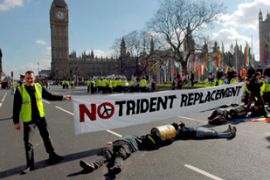MPs back upgrade of UK nuclear arms
Decision to renew Britain’s Trident system supported by UK parliament.

Published On 14 Mar 2007
Labour MPs quit
But many members of his own party disagreed, with four Labour MPs quitting on Wednesday over the government’s proposals, weakening Labour’s 67-seat majority in the 646-member lower house of parliament.
|
“It’s a complete waste of money, it’s no good against suicide bombers and we can’t afford it” Tony Benn, |
Nigel Griffiths, one of the four Labour politicians to quit their posts, said: “We must lead the world in campaigning for the eradication of the nuclear threat and we must lead by example.”
Around 85 members of Blair’s Labour Party voted against the plan to buy a new nuclear weapons system, the biggest rebellion against the prime minister since a 2003 vote on whether to go to war in Iraq, according to one politician.
With many of Blair’s own party members voting against him, the motion was only passed after opposition Conservative MPs supported it.
Tony Benn, a former British minister, speaking on Al Jazeera’s Inside Story programme, called Trident a “waste of money”, saying it tied the UK to American foreign policy.
‘Waste of money’
Benn said: “It’s American technology. If Blair pressed the button our Trident wouldn’t go anywhere unless the US switched on their satellite navigation system. All this really means is that British foreign policy would be linked permanently to the US.
“It’s a complete waste of money, it’s no good against suicide bombers and we can’t afford it.”
The Labour Party had long-espoused a policy of unilateral nuclear disarmament, but the government now says it must act quickly to have new submarines ready when the Vanguards reach the end of their lives in 2024.
Backing Blair, Margaret Beckett, the British foreign secretary, said no one could be sure a new nuclear threat would not emerge over the next 50 years.
“While such a risk exists this government believes that maintaining a minimum nuclear deterrent remains a premium worth paying on an insurance policy for our nation,” she said.
She said Britain would reduce its stockpile of operationally available nuclear warheads by 20 per cent in 2007 to fewer than 160.
Britain’s nuclear arsenal, which consists of four British-built Vanguard-class submarines carrying 16 US-supplied Trident long-range missiles armed with British-built nuclear warheads, is the smallest among the five permanent members if the UN Security Council.
Source: News Agencies